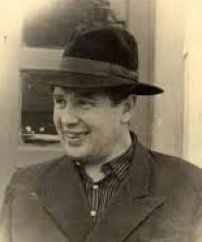Pavel Rusakov
also known as: Paul Marcel, Pol Marsel, Paul Marseille, Pavel Alexandrovich Rusakov, Pavel Ioselevich
Pavel Alexandrovich Ioselevich was born 1908 in Marseille (France). His father Alexander Ivanovich Ioselevich was a Bolshevik and of Jewish faith. In the Russian Revolution of 1905 the family had to flee from Russia and settled in Marseille (France). There the family assumed a new family name and called themselves Rusakov. The Russian version of Pavel was adjusted to French needs into Paul. Most likely the idea of "Paul [from] Marseille" led to the later version of his given name to "Paul Marcel" which is phonetically nearly the same.
During the Russian Revolution of 1917 the father of Pavel participated in Russia-related protests in France and was forced to move back to Russia as a result. For that reason the family settled in Saint Petersburg in 1919. After school Pavel Rusakov studied at the conservatory in Saint Petersburg. He became a friend of Dmitri Shostakovich, who studied there at the same time.
After his studies Pavel Rusakov joined the artistic circles of Saint Petersburg. He performed as a pianist in cinemas but also as a member of a jazz ensemble. He also connected with writers like Sergei Yesenin, Alexander Blok, Boris Pasternak, or Daniil Kharms (the latter was his brother-in-law, having married Pavel Rusakov's sister Ester) and set their poems to music. He also made his mark with composing tango music.
In 1937 Pavel Rusakov was arrested for being a Trotskyist and sentenced to 10 years camp detention in the gulag of Vjatlag. He was released in 1947 and moved to Voronezh where he worked as conductor in a local circus. From 1949 to 1956 Pavel Rusakov worked in a similar position in Ivanovo. It was not before 1956 that Pavel Rusakov was fully rehabilitated and with the help of Dmitri Shostakovich could move back to Saint Petersburg. There he again worked as a conductor and music director in a circus.
Pavel Rusakov died in 1973 in Saint Petersburg.
There is little information about the complete work catalogue of Pavel Rusakov. But there are several songs by him that are extremely popular to this day. Among these songs are "Druzba" (Friendship) on a text by Andrei Shmulian, "Grenada" with words by Mikhail Svetlov, "The Girl from Nagasaki" by Vera Inber, "Vintik-Shpuntik" by Nicolai Agnivcev, "The Golden Grove" by Sergei Yesenin or "Goodbye" by Boris Pasternak.
Prelude for piano
In my possession is the autograph manuscript of the "Prelude for piano" by Pavel Rusakov. The work was composed in 1932 in Sverdlovsk (now Yekaterinburg) and seems to be unpublished. My manuscript has a dedication to a "Sergei Babynin-Ordynsky", but I could not find a reference to a person of this name. The dedication is dated 28 November 1932.
For information purpose I would like to present the score here:
